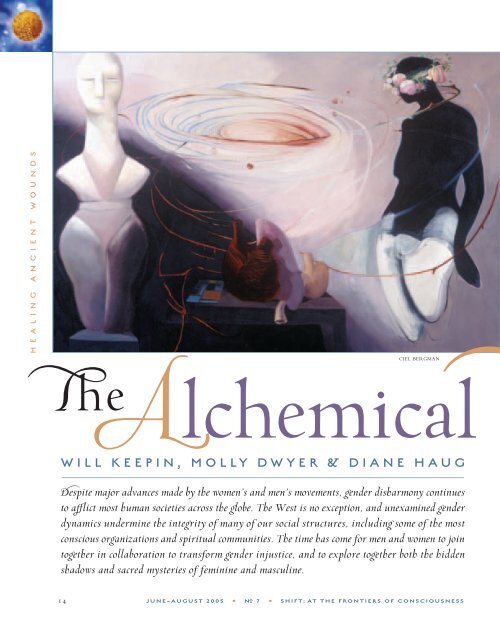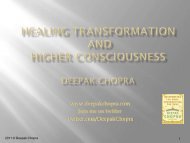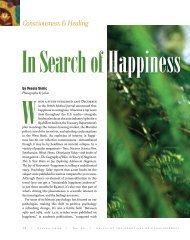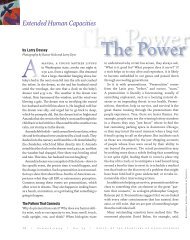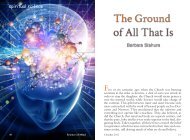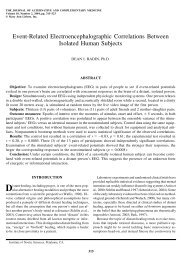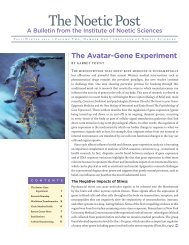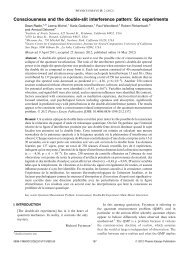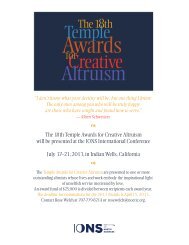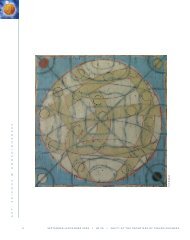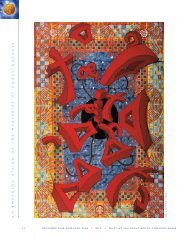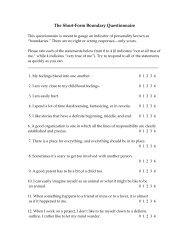The Alchemical Communion - Institute of Noetic Sciences
The Alchemical Communion - Institute of Noetic Sciences
The Alchemical Communion - Institute of Noetic Sciences
You also want an ePaper? Increase the reach of your titles
YUMPU automatically turns print PDFs into web optimized ePapers that Google loves.
H E A L I N G A N C I E N T W O U N D S<br />
CIEL BERGMAN<br />
<strong>The</strong><strong>Alchemical</strong> WILL KEEPIN, MOLLY D WYER & DIANE HAUG<br />
Despite major advances made by the women’s and men’s movements, gender disharmony continues<br />
to aflict most human societies across the globe. <strong>The</strong> West is no exception, and unexamined gender<br />
dynamics undermine the integrity <strong>of</strong> many <strong>of</strong> our social structures, including some <strong>of</strong> the most<br />
conscious organizations and spiritual communities. <strong>The</strong> time has come for men and women to join<br />
together in collaboration to transform gender injustice, and to explore together both the hidden<br />
shadows and sacred mysteries <strong>of</strong> feminine and masculine.<br />
14<br />
JUNE–AUGUST 2005 • # 7 • SHIFT: AT THE FRONTIERS OF CONSCIOUSNESS
O ver the past decade, we at the Satyana <strong>Institute</strong><br />
have organized or co-convened nearly forty<br />
events in “Gender Reconciliation,” held in the<br />
United States, India, South Africa, Australia, and Croatia.<br />
<strong>The</strong>se gatherings are charting inspiring new ground as<br />
women and men gather to jointly plumb the depths <strong>of</strong><br />
feminine and masculine, unmasking the invisible knots <strong>of</strong><br />
cultural conditioning around gender and sexuality.<br />
Together we explore the “undiscussables” <strong>of</strong> gender<br />
and unravel conditioned patterns <strong>of</strong> behavior. <strong>The</strong><br />
process follows an alchemical wisdom as we unveil our<br />
personal histories, move beyond habitual ways <strong>of</strong> relating,<br />
and discover a higher,universal realm <strong>of</strong> love and communion<br />
between masculine and feminine—within ourselves and<br />
in our relationships.<br />
THE HEART OF RECONCILIATION<br />
A detailed explanation <strong>of</strong> gender reconciliation work<br />
is beyond the scope <strong>of</strong> this article, but we can give an<br />
example <strong>of</strong> where the process <strong>of</strong>ten leads.<br />
On the last day <strong>of</strong> a five-day intensive workshop<br />
held in Southern California in May 2002, the time<br />
came for the women and men to create rituals <strong>of</strong> honoring<br />
and blessing for each other. At this point, the<br />
group <strong>of</strong> twenty had already spent four intensive days<br />
masculine and feminine. Such rituals create a special<br />
“time out <strong>of</strong> time,” in which deep learning <strong>of</strong>ten takes<br />
place that carries lessons for life beyond the ritual itself.<br />
<strong>The</strong> power and beauty <strong>of</strong> these rituals is directly proportional<br />
to the authenticity and depth <strong>of</strong> healing work<br />
and truth-telling that has preceded them.As the men and<br />
women choreographed ritual <strong>of</strong>ferings for each other,<br />
they entered into a rarified environment <strong>of</strong> tenderness<br />
and sincerity. Because their hearts were so open, they<br />
were willing to risk in ways that might have seemed<br />
unthinkable only days before.<br />
<strong>The</strong> men began the process by ushering the women,<br />
one by one, into a beautiful, sanctuary-like setting, and<br />
seating them in a semicircle facing the men.<strong>The</strong>n, one at<br />
a time, each man stepped forward before the women, and<br />
spoke to the injustices that he himself felt culpable for in<br />
his relationships with women, and with other men. Each<br />
man named a behavior or characteristic that he no longer<br />
found acceptable in himself, and committed to changing<br />
it. <strong>The</strong> men had written these behaviors on paper<br />
beforehand, and after speaking them, burned these written<br />
words in a ceremonial fire pot—dramatically ritualizing<br />
their commitment to move beyond what they felt to<br />
be their former unconsciousness or misdeeds.<br />
After their words were burned, the men made personal<br />
vows <strong>of</strong> their new alliance with the women.<strong>The</strong>se vows,<br />
New Frontiers in Gender Healing<br />
<strong>Communion</strong><br />
grappling with several highly charged gender issues,<br />
including rape and sexual abuse. Most had never<br />
addressed these issues so poignantly in mixed company<br />
before, and a deep experience <strong>of</strong> powerful revelations<br />
and empathic insight had been awakened.<br />
<strong>The</strong> task at this point was for the women and men to<br />
create rituals for one another. <strong>The</strong>se are participatory<br />
ceremonies designed and conducted by the participants<br />
to acknowledge the healing work that has transpired,<br />
to express gratitude, and to honor the communion <strong>of</strong><br />
like the misdeeds, were unique to each man, and were<br />
made together with a symbolic <strong>of</strong>fering <strong>of</strong> summer blossoms<br />
the men had gathered. Each man spoke his vow, bowed<br />
deeply before the women, and then floated his blossom in<br />
a basin <strong>of</strong> scented water. When all the blossoms were in<br />
the basin, each placed with a particular blessing, the men<br />
took the water and anointed each woman—speaking her<br />
name and <strong>of</strong>fering specific reflections <strong>of</strong> her soul’s depth<br />
and beauty.<strong>The</strong> men then stood together before the women,<br />
bowed, and prostrated themselves on the ground. <br />
SHIFT: AT THE FRONTIERS OF CONSCIOUSNESS • # 7 • JUNE–AUGUST 2005 15
Many <strong>of</strong> the women wept. Nothing had prepared<br />
them for the power <strong>of</strong> this <strong>of</strong>fering, which the men had<br />
freely created; it was not the result <strong>of</strong> facilitators’ planning<br />
or the program agenda.<strong>The</strong> women understood that the<br />
men were acknowledging the ways in which cultural<br />
conditioning creates a difficult maze <strong>of</strong> gender dynamics<br />
that women are forced to grapple with, <strong>of</strong>ten on a daily<br />
basis.<strong>The</strong> men had expressed personal awareness <strong>of</strong> these<br />
realities in a ritualized manner that was not just an<br />
acknowledgment or apology, but rather an expression<br />
<strong>of</strong> determination to transform their own complicity in<br />
creating and upholding these damaging patterns.<br />
Deeply moved, the women then escorted the men,<br />
one at a time, into the community room, which they<br />
had decorated with flowers and candles.<strong>The</strong>y seated the<br />
men in a circle and gave them flowers to hold.<strong>The</strong>n the<br />
women began chanting a song <strong>of</strong> compassion and love<br />
that they continued throughout the ritual. As they<br />
chanted, they moved around the circle. Each woman<br />
stopped before each man and thanked him individually<br />
by naming the man’s virtues, gifts, and beauty. Each<br />
woman made her <strong>of</strong>ferings to the men in whatever<br />
16<br />
way felt appropriate: s<strong>of</strong>tly whispering appreciation,<br />
grasping hands, giving a warm hug or a sisterly kiss,<br />
bowing, massaging the man’s feet with her hands, or simply<br />
looking fully and silently into each man’s eyes—<br />
<strong>of</strong>fering each man her respect, affection, and honor.<br />
Tears flowed freely on both sides.<br />
As one man put it, these rituals were “without a<br />
doubt” the pinnacle <strong>of</strong> the workshop:<br />
<strong>The</strong> ritual in which the women honored us men was<br />
sublime. I felt like each woman, thanking me in her<br />
own way, was a unique incarnation <strong>of</strong> the goddess. It<br />
was a magnificent, intensely beautiful evocation <strong>of</strong> the<br />
many facets <strong>of</strong> the divine feminine. It was truly a<br />
transcendental experience.<br />
And as one woman described:<br />
I felt all those unresolved issues within myself, and then<br />
saw all the contradictions break apart, and our hearts<br />
break open, when in ritual on the last day the men<br />
prostrated themselves in front <strong>of</strong> us. I saw tears in their<br />
eyes as the women circled in honor <strong>of</strong> them. Out <strong>of</strong> the<br />
ashes <strong>of</strong> our disagreements and confrontations rose the<br />
sacred masculine and the sacred feminine again.<br />
JUNE–AUGUST 2005 • # 7 • SHIFT: AT THE FRONTIERS OF CONSCIOUSNESS
CIEL BERGMAN<br />
THE UNFATHOMABLE POWER OF LOVE<br />
We have discovered through this work <strong>of</strong> gender<br />
reconciliation that there are crucial gaps in women’s<br />
awareness <strong>of</strong> men, and men’s awareness <strong>of</strong> women, and<br />
<strong>of</strong> one another’s inner experience and social realities.<br />
<strong>The</strong>se gaps are kept in place by all manner <strong>of</strong> taboos<br />
and proscribed topics <strong>of</strong> conversation or inquiry in<br />
our culture—especially in mixed company, but also<br />
within each gender.Yet it is precisely through jointly<br />
exploring these challenging arenas that true healing<br />
and transformation can take place.<strong>The</strong> process is driven<br />
by the unfathomable power <strong>of</strong> love, which sets a<br />
mysterious alchemy into motion that operates in ways<br />
beyond what the rational mind can comprehend. (To<br />
support the growth <strong>of</strong> this work, the Satyana <strong>Institute</strong> has<br />
begun training facilitators in gender reconciliation, and<br />
completed the first certification training in May 2005).<br />
Gender reconciliation work has broad potential<br />
for application in other arenas <strong>of</strong> human conflict. For<br />
example, during the 1990s the late peace activist<br />
Danaan Parry was facilitating intensive peacebuilding<br />
work with a group <strong>of</strong> Catholics and Protestants in<br />
Northern Ireland. One day, when the process had<br />
reached an impasse, he surprised everyone by giving<br />
them a new task. “We’ve all heard the challenging<br />
One at a time, each man stepped<br />
forward before the women, and spoke<br />
to the injustices that he himself felt<br />
culpable for in his relationships with<br />
7<<br />
women.Each man named a behavior<br />
or characteristic that he no longer<br />
found acceptable in himself, and<br />
committed to changing it.<br />
issues on both sides <strong>of</strong> this conflict for a long time<br />
now,” he said. “So today we’re not going to focus on<br />
that.What I want to know today is:What is it like to<br />
be a woman in Northern Ireland? What is it like to be<br />
a man in Northern Ireland?”<br />
Parry then partitioned the group, placing all the<br />
women on one side <strong>of</strong> the room, and all the men on the<br />
other. As the Catholic and Protestant women looked<br />
at themselves—and listened to each other’s stories—<br />
they soon discovered that they were all living the exact<br />
same nightmare. <strong>The</strong>y empathically identified with one<br />
another’s fears for their children’s lives, and sadness for<br />
their lost husbands and brothers. Before long, they were<br />
in tears and holding each other, commiserating in mutual<br />
grief and compassion. <strong>The</strong> men had a parallel healing<br />
experience as they, too, discovered their shared reality<br />
as men, across the religious divide.Through the doorway<br />
<strong>of</strong> gender, the community <strong>of</strong> women came together,<br />
as did the men, and in so doing a pr<strong>of</strong>ound healing bridge<br />
was created. Both sides came to realize that they had<br />
taken their first major step toward mutual understanding<br />
and peace.<br />
This example illustrates a fundamental principle<br />
<strong>of</strong> gender reconciliation work:A critical turning point<br />
is reached when individuals perceive the truth <strong>of</strong> the<br />
“other” as their own experience.Through the doorway<br />
<strong>of</strong> empathic identification, people are led to discover<br />
a deeper underlying unity . . . namely, that there is<br />
no other. Gender reconciliation provides a practical<br />
and universal doorway for this experience, regardless<br />
<strong>of</strong> religious faith or spiritual orientation.<br />
GENDER RECONCILIATION<br />
IN OTHER CULTURES<br />
We have discovered that our approach to gender<br />
reconciliation is transferable to diverse cultural contexts,<br />
for several reasons. First, the dynamics <strong>of</strong> gender<br />
injustice bear key similarities across virtually all societies,<br />
despite cultural differences in manifestation and<br />
intensity. Second, our methodology focuses directly<br />
on specific issues or conflicts activated within the<br />
community at hand. Third, this approach to gender<br />
healing work is grounded in the spiritual foundations<br />
<strong>of</strong> the collective heart, which invokes a power or grace<br />
that ultimately transcends not only gender difference,<br />
but cultural difference as well. <strong>The</strong> alchemy seems<br />
inevitably to produce its gold, regardless <strong>of</strong> the<br />
cultural setting. <br />
SHIFT: AT THE FRONTIERS OF CONSCIOUSNESS • # 7 • JUNE–AUGUST 2005 17
7<<br />
In 2002, Satyana <strong>Institute</strong> introduced its gender<br />
reconciliation in India to a group <strong>of</strong> forty-two Indian<br />
Catholic priests and nuns.<strong>The</strong> eight-day event was held<br />
outside Bombay at the Sadhana <strong>Institute</strong>, a pastoral<br />
retreat center founded by Jesuit priest Anthony de Mello.<br />
Painful experiences <strong>of</strong> sexual abuse by priests were<br />
brought forward, coupled with denial and enabling<br />
complicity in the Church leadership, reflecting patterns<br />
similar to recent revelations in the Catholic Church<br />
in the United States.A backlash followed, led by a few<br />
priests against the nuns and other priests who brought<br />
these revelations to light.After a poignant confrontation,<br />
we worked through the ensuing difficulties and<br />
eventually reached a respectful and joyous resolution<br />
that brought deep learning for all.<strong>The</strong> power <strong>of</strong> gender<br />
to humble a community to its knees and then uplift it<br />
in grace was exquisitely demonstrated.<br />
In autumn <strong>of</strong> 2005, the Satyana <strong>Institute</strong> will present<br />
a five-day intensive retreat on gender reconciliation in<br />
South Africa for an invited group <strong>of</strong> Members <strong>of</strong><br />
Parliament and other senior government <strong>of</strong>ficials. Since<br />
18<br />
Without the God,<br />
<strong>The</strong>re is no Goddess,<br />
Without the Goddess,<br />
<strong>The</strong>re is no God.<br />
How sweet is their love!<br />
Embracing each other,<br />
<strong>The</strong>y merge into One,<br />
As darkness merges with the light<br />
As the breaking <strong>of</strong> dawn.<br />
When we discover their Unity<br />
All words and all thoughts<br />
Dissolve into silence. . .<br />
—FROM THE MYSTICAL POET JNANESWAR<br />
apartheid ended, the numbers <strong>of</strong> women in Parliament<br />
have radically increased, but the gender dynamics<br />
haven’t changed, and women’s voices and influence<br />
are still not well represented. Satyana’s program is<br />
intended as part <strong>of</strong> a new initiative to support the<br />
implementation <strong>of</strong> gender equality in South African<br />
society. <strong>The</strong> country’s new Constitution is remarkable in<br />
its guarantee <strong>of</strong> gender equality and justice to all citizens<br />
in its Bill <strong>of</strong> Rights, but gender awareness still lags far<br />
behind racial awareness. This work has grown out <strong>of</strong><br />
our first South African program in 2003, in which we<br />
introduced gender reconciliation to a diverse group <strong>of</strong><br />
thirty-two pr<strong>of</strong>essionals in collaboration with the Quaker<br />
Peace Center in Cape Town.<strong>The</strong> racial mix in this group<br />
was two-thirds people <strong>of</strong> color and one-third whites, and<br />
the process unfolded in broadly familiar patterns.<br />
A BLOSSOMING FLOWER<br />
<strong>The</strong> gender crisis is ultimately a collective spiritual<br />
crisis, and thus a “higher” or “spiritual” dimension <strong>of</strong><br />
consciousness is essential to transforming gender<br />
dynamics. Only on this level can the duality <strong>of</strong><br />
opposites be resolved in a higher unity. <strong>The</strong><br />
Vietnamese Buddhist monk Thich Nhat Hanh has said<br />
that the next Buddha will emerge not in the form <strong>of</strong><br />
an individual, but in the form <strong>of</strong> a community <strong>of</strong> people<br />
living in loving-kindness and mindful awareness.<br />
Many contemporary spiritual leaders and mystics are<br />
making similar observations, and gender reconciliation<br />
is one <strong>of</strong> many strands <strong>of</strong> such community-level spiritual<br />
work that are now beginning to flower.<br />
WILL KEEPIN, PHD, is Executive Director <strong>of</strong> Satyana<br />
<strong>Institute</strong>. He has organized 40 events in gender reconciliation,<br />
and is completing a book documenting this work. His advocacy<br />
work in environmental science influenced policy in several countries.<br />
Will has published 35 articles and leads retreats on interfaith<br />
mysticism and its relation to science and social change.<br />
MOLLY DWYER, PHD, is former Vice-President <strong>of</strong> Satyana<br />
<strong>Institute</strong>.She received the 1999 Vicker’s Award from the International<br />
Society for the Systems <strong>Sciences</strong> for her paper,“<strong>The</strong> Emergent Feminine.”<br />
Molly’s forthcoming books include Requiem: A Philosophical<br />
Novel for the Authoress <strong>of</strong> Frankenstein.<br />
DIANE HAUG, MA, LPCC, is a licensed mental health<br />
pr<strong>of</strong>essional and certified practitioner <strong>of</strong> Holotropic Breathwork.As<br />
a senior member <strong>of</strong> the Gr<strong>of</strong> Transpersonal Training staff, she has been<br />
involved with workshops and pr<strong>of</strong>essional trainings throughout the<br />
world including South America, Russia, Europe and Scandinavia.<br />
JUNE–AUGUST 2005 • # 7 • SHIFT: AT THE FRONTIERS OF CONSCIOUSNESS


